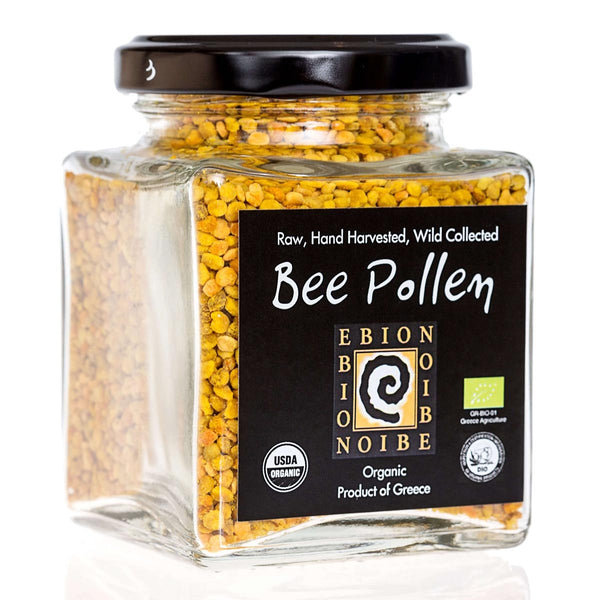Is honey actually medicinal? Or is it just marketing?
If you’ve scrolled through wellness blogs or picked up a jar of honey labeled “raw” or “healing” at your local market, have you also wondered whether honey is actually medicinal?
In our article “Raw Honey vs Regular Honey”, you’ll see that the raw unfiltered honey we make at BeeVitamin is actually very high in polyphenols and comes with a ton of health benefits.
And here’s what many people don’t realize—the connection between honey and medicine is ancient. Literally.
If you trace the roots of modern medicine back to their origins, you end up in one place: Greece.
Hippocrates: The Original Wellness Influencer


Thousands of years ago, before anyone had a microscope or a lab, honey was considered one of nature’s most potent and reliable healing agents.
Honey and Healing: A Partnership Forged in Nature

Long before we had synthetic drugs, we had bee vitamin - a fusion of wild botanicals and hardworking hives.
Honey from the hills of Greece was especially revered, thanks to the region’s biodiversity, pristine climate, and wild medicinal plants like thyme, sage, and oregano.
Bees collect nectar from these herbs, infusing their honey with natural plant compounds called polyphenols - the same antioxidants we now associate with superfoods.
Today, scientists are proving what Hippocrates somehow already knew:
- Honey fights bacteria
- Honey calms inflammation
- Honey supports the gut and immune system
- And honey is packed with bioactive nutrients like amino acids and enzymes
Greece: The Land Where Wellness Began
At BeeVitamin, we go back to the source - the Arta Mountains of Greece, where ancient traditions and unspoiled nature still thrive.
Our 3rd generation beekeeper, Nikos, follows time-honored methods passed down through generations, producing small-batch honey in the same land Hippocrates once walked.
We don’t take shortcuts. We don’t do processing. We just make pure, living honey.
Why Ancient Wisdom Still Matters
You don’t need a PhD to know that some of the best health solutions are the oldest. Hippocrates may have lived over 2,000 years ago, but his approach to medicine still resonates today:
“Let food be thy medicine, and medicine be thy food.”
That’s exactly what BeeVitamin stands for.
Our honey isn’t just a sweetener. It’s a living connection to ancient medicine - made by bees, harvested by hand, and delivered straight from Greece to your kitchen.
Conclusion: Embracing the Legacy of Greek Honey in Modern Wellness
From the ancient teachings of Hippocrates to today's holistic health practices, the use of honey as a natural remedy has stood the test of time.
Our raw honey, harvested from the pristine landscapes of Greece, embodies this rich heritage, offering not just sweetness but a connection to centuries-old medicinal traditions.
Incorporating raw Greek honey benefits for health into your daily routine is more than a dietary choice; it's a nod to the wisdom of ancient medicine.
Whether you're seeking natural ways to boost immunity, soothe ailments, or simply enjoy a wholesome sweetener, our honey serves as a bridge between the past and present, delivering time-honored wellness in every spoonful.

FAQs About Ancient Greek Honey and Its Health Benefits
-
Question: What are the health benefits of raw Greek honey?
Answer: Raw Greek honey is renowned for its rich antioxidant content, including polyphenols,whichcontribute to its anti-inflammatory and immune-boosting properties. Regular consumption can aid in digestion, support heart health, and provide natural energy.
-
Question: How does Greek honey differ from other types of honey?
Answer:Greek honey, particularly from regions like the Arta Mountains, is produced from a diverse array of wildflowers and herbs, resulting in a unique flavor profile and higher concentrations of beneficial compounds.
Its traditional harvesting methods preserve its natural qualities, distinguishing it from more commercially processed honeys.
-
Question: Can raw Greek honey support digestive health?
Answer: Yes, the enzymes and natural prebiotics found in raw Greek honey can promote healthy gut flora, aiding in digestion and contributing to overall gastrointestinal well-being.
-
Question: Is raw Greek honey suitable for children?
Answer: While raw honey offers numerous health benefits, it should not be given to children under one year of age due to the risk of botulism.
For older children and adults, raw honey serves as a nutritious alternative to refined sugars.
-
Question: How can I incorporate raw Greek honey into my diet?
Answer: Raw Greek honey can be enjoyed in various ways: drizzled over yogurt, stirred in with smoothies, stirred into tea, used as a natural sweetener in baking, or simply consumed by the spoonful to savor its rich taste and health benefits.
REFERENCE LIST:
Here’s a list of the references included in our article above:
-
Integra Tissue Technologies:
https://tissuetechnologies.integralife.com/the-medical-use-of-honey-across-centuries/. - Traditional and Modern Uses of Natural Honey in Human Diseases: A Review - https://pmc.ncbi.nlm.nih.gov/articles/PMC3758027/.
- Vinegar: Medicinal Uses and Antiglycemic Effect: https://pmc.ncbi.nlm.nih.gov/articles/PMC1785201/
- Honey: its medicinal property and antibacterial activity: https://pmc.ncbi.nlm.nih.gov/articles/PMC3609166/
- Honey and its nutritional and anti-inflammatory value: https://pmc.ncbi.nlm.nih.gov/articles/PMC7807510/
- The Potential of Honey as a Prebiotic Food to Re-engineer the Gut Microbiome Toward a Healthy State: https://pmc.ncbi.nlm.nih.gov/articles/PMC9367972/
- pH and (Amino) Acids in Honey: https://ucfoodsafety.ucdavis.edu/sites/g/files/dgvnsk7366/files/inline-files/ph_acid.pdf
- Biochemical Reactions and Their Biological Contributions in Honey: https://pmc.ncbi.nlm.nih.gov/articles/PMC9331712/
